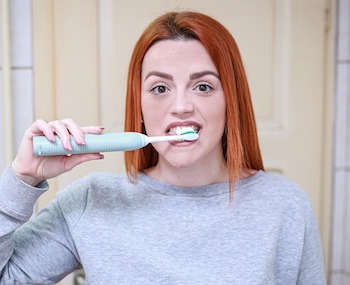Let’s face it – bad breath is hard to swallow.
We’ve all been stuck talking to someone who’s breath wasn’t overly pleasant or perhaps even downright stinky. It can be one of those awkward social situations – a bit like bad body odour – do you say something or just try to get out of there as soon as you can?
Occasional bad breath
Sometimes bad breath, or halitosis, can be simply because we’ve decided to indulge on a tin of canned tuna, or we have been in such a rush to get to work that we’ve forgotten to clean our teeth in the morning. Coffee breath is so eeewwwwww!
It’s no surprise that store shelves are overflowing with gum, mints, mouthwashes, and other products designed to fight bad breath. But most of these products are just temporary measures.
There are many causes of occasional bad breath such as acid reflux, eating strong smelling foods like garlic and onion, or simply being unwell with a sore throat or respiratory infection. These are part of life and quite normal. But there is a big difference between these sorts of causes AND having chronic halitosis.
What causes chronic bad breath?
Chronic bad breath is often the result of tooth decay, gum disease or a coated tongue. It’s caused by a build-up of hundreds of bacteria on the tongue, gums, and throat. They live on the tongue or below the gum line or in pockets created by gum disease between your gums and teeth. That type of bacteria doesn’t need light to survive, so it burrows down into the roots and can create real – and smelly – problems.
Dry mouth
Dry mouth is also a condition that can lead to bad breath. Smoking or certain medications can cause dry mouth, along with some foods, like caffeine and alcohol. Dry mouth is caused by slowing saliva production, when there is not enough saliva in the mouth to wash out the bacteria which then results in a build-up of food particles and nasty bacteria that will cause that horrible smell.
That is why brushing and flossing is so important to manage or eliminate smelly breath – to clean out all those pockets in your mouth which can fill with bacteria. It also helps if you drink plenty of water and swish cool water around your mouth to help to freshen “morning breath.”
Clean your tongue
Tongue scraping with a tongue cleaner can also help eliminate food and bacteria build up on your tongue. These are available in most dental clinics and stores so ask for one – the next time you are in for your checkup.
Covering up chronic bad breath with a bottle of strong mouth wash will only work in the short term. It will help with the smell briefly but it won’t help the cause of the problem. In fact, mouth washes which contain alcohol can sometimes dry out your mouth and make things worse.
Medical conditions
Several underlying medical conditions can lead to chronic bad breath. Diabetes, kidney failure, and lung infections can all cause bad breath. If you suspect your bad breath is caused by an underlying health issue, talk to your doctor.
Oral hygiene
If you think your bad breath could be the result of an oral hygiene issue, such as an infection in your mouth, we would highly recommend you drop your dentist a line and book for an appointment.
Leaving any form of gum disease and tooth decay too long may ultimately lead to more serious health problems down the track. So get it checked out by us as soon as you can.
Learning proper dental hygiene is the first and best step to achieving fresh breath.
Regular dental check-ups and cleans are also very important.
Bad breath can be embarrassing, but it really doesn’t need to be that way.
By Taylor. D,
Christ & Co.













